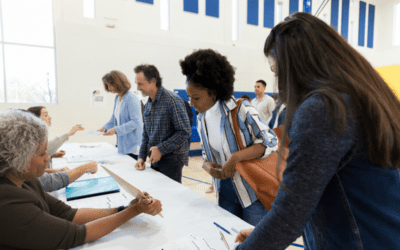
#image_title
6 voters, 1 poll worker test positive for COVID-19 following election participation
Seven people appear to have contracted the coronavirus due to the dangerous April 7 election in Wisconsin held amid the global coronavirus pandemic, Milwaukee’s health commissioner said.
Commissioner Jeanette Kowalik said six of the cases involve Milwaukee voters and one is a Milwaukee poll worker, the Milwaukee Journal Sentinel reported.
Officials hope to have additional information on the cases by the end of the week, including whether any of them were concentrated in any of the city’s five polling places or if any resulted in death, Kowalik said Monday.
“I don’t think anyone’s really surprised by it,” said Angela Lang, executive director of Black Leaders Organizing for Communities, or BLOC, a voter-mobilization group on Milwaukee’s north side. “I think we all knew it was coming, and I think a lot of us anticipate those numbers increasing in the next couple days and in the next couple weeks. But it doesn’t make it any less heartbreaking.”
Wisconsin Department of Health Services Secretary Andrea Palm said Monday there were no signs yet of a surge in cases from the election as some feared. Palm noted, however, that if cases do exist symptoms may not have appeared yet. Tuesday marks the 14th day since the election, which is a time frame during which health officials say symptoms typically appear.
Melvette Scott, a 52-year-old substance abuse counselor who handed out bandanas to unprotected voters at Milwaukee’s five polling sites on election day, said she was not surprised to hear of the confirmed cases but was still dismayed.
“Seven people’s lives are impacted because of politics,” she said, referencing how the conservative-leaning state Supreme Court overturned Gov. Tony Evers’ executive order to delay the election until June.
State Republicans brought the case to the Supreme Court to challenge the governor’s authority to unilaterally change the election.
“As long as politicians continue to use human beings as leverage for their agenda, I would just encourage everyone to take all the measures to protect themselves,” Scott said.
About 20,000 voters who went to the polls in Milwaukee stood in lines hundreds of voters long that took up to three hours to get through. Many had no protective gear. The city typically has 182 polling places open, but the number was reduced to five due to a severe poll worker shortage.
Thousands more Wisconsin voters stayed home, unwilling to risk their health and unable to be counted because requested absentee ballots never arrived.
“There are folks that really can’t risk getting sick,” said David Bowen, a Democratic state representative from Milwaukee’s north side who is a coronavirus survivor. “Folks that are at risk, we can’t put them in harm’s way like that.”
Green Bay’s polling places were likewise reduced. The city of about 105,000 typically has more than 30 polling places open, but on April 7 had just two. Cases exploded in Brown County over the weekend, going from 173 cases on Friday to 317 on Tuesday.
In a call with reporters on Tuesday, Ted Shove, public information officer for the Brown County Health Department, said it is unclear if any of the increase is linked to in-person voting. He said health officials will have more information by the end of the week.
A portion of the increase has already been attributed to a cluster of infections at the JBS meat-processing plant in Green Bay, but the health department has not released the total number of cases tied to the plant.
Eric Genrich, the Democratic Green Bay mayor, was a vocal opponent of in-person voting, even before Evers changed his mind and advocated for a mail-in election. Green Bay unsuccessfully sued the state to postpone the election, citing health risks and worker shortages.
As of Tuesday afternoon, 4,620 Wisconsinites had been diagnosed with coronavirus, and 242 had died, according to the state Department of Health Services. More than 1,200, or 27 percent, of patients were hospitalized.
The Associated Press contributed to this report.

This billionaire’s PAC is spreading a big lie about Tammy Baldwin, Medicare, and taxpayer savings
Restoration PAC, funded by Uline’s Richard Uihlein, twists the significance of forcing Big Pharma to negotiate for lower bulk pricing on Medicare...

New Biden rules deliver automatic cash refunds for canceled flights, ban surprise fees
In the aftermath of a canceled or delayed flight, there’s nothing less appealing than spending hours on the phone waiting to speak with an airline...

Opinion: It’s time for Congress to fight for small businesses instead of big corporations
May is National Small Business Month. Our elected leaders need to show leadership all year long. For the past 27 years I’ve been fortunate to pursue...

Biden makes 4 million more workers eligible for overtime pay
The Biden administration announced a new rule Tuesday to expand overtime pay for around 4 million lower-paid salaried employees nationwide. The...




